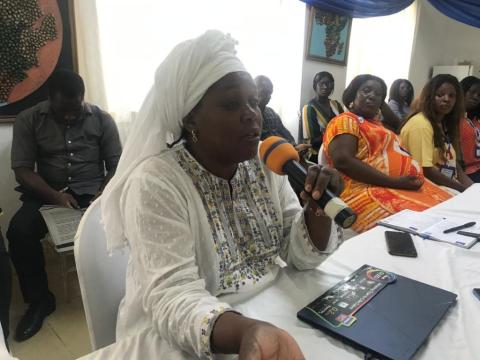By Mabinty M. Kamara
Women from across mining-affected countries in Africa last week converged in Freetown to advocate and fight against mining injustices affecting women across the continent on the theme “the right to say no”.
Speaking at a press conference after the two-day conference which they described as a learning, exchange, and solidarity meeting for Sierra Leonean women facing injustices due to indiscriminate mining activities being carried out in their communities, Esther Kandeh, the Executive Director for Women in Extractives Sierra Leone (WOME) said the conference brought a lot of perspectives and fresh ideas on the issues affecting women in mining communities from Liberia to South Africa and how as women they can come together to address those challenges highlighted. She said the challenges identified such as the lack of consultations, resettlement issues, and contamination of water sources among others cut across the countries in Africa.
In his statement, the Executive Director of Network Movement for Justice and Development one of the partner organisations of WOME, said that the natural resource world is dominated by men and that it is a place where money and resources interact and in the process of getting the desired resources, women suffer the most. This he said is the reason for the solidarity meeting of the women in countries affected by mining across the continent to share experiences and give comfort and support to each other. “And to develop a strategy to ensure that natural resources benefit everybody and that they do not become the sacrificial lamb. So this press conference is highlighting critical actions that must be taken by different actors most especially government, corporate entities, Civil Society Organizations and local communities,” he said.
He noted that the actions highlighted in the communiqué “if taken in good faith will lead to a transformation where women will not suffer, where our country will not be poor but becomes rich, and our communities become happy, where our lands will not be devastated, where our waters will not be polluted, and where our lives will be enriched.” He said it is also a fight to save men.
Speaking at the event, Georgine Kengne from WoMin Alliance in Cameroon said their advocacy effort is centred mainly on extractives with a focus on the rights of women in mining communities.
She explained that at the start of their group which is based in South Africa, women in mining communities were excluded in decision-making processes and agreements relating to mining activities in their communities.
“In the communities where consents were sought, it is only men that were asked, the chiefs and the elders in the community were the ones approached, so women, young people were not around the table for discussions nor were they informed but that they will wake up in the morning and be asked to move as a mining company is about to commence an operation,” she said.
However, she said they have made some progress in ensuring that women are involved in decision-making processes across all levels.
Another participant from Senegal Aby Dia explained how her organization Lumier Synergie pour le Development/LSD utilized both the mainstream and social media to galvanize support and make the challenges of women known through community radios and other platforms.
The women in their communiqué noted the challenges faced by women and children in mining communities while calling for action. “In furtherance thereof, in desirous of drawing the attention of critical stakeholders to the suffering and challenges faced by women in Mining communities across the African region, and demanding concrete actions from these stakeholders to address these challenges, the participants developed this communiqué which they all subscribed to,” it reads.
In the document, the women called for the formation of better laws and regulations, the reformation of the environmental impact assessment process to ensure independence, transparency, human rights and gender impacts of mining projects, and facilitate international engagement and advocacy among others. The visit was climaxed by a field visitation to mining communities in Lunsar Northern Sierra Leone.
Copyright © 2024 Politico (13/05/24)








